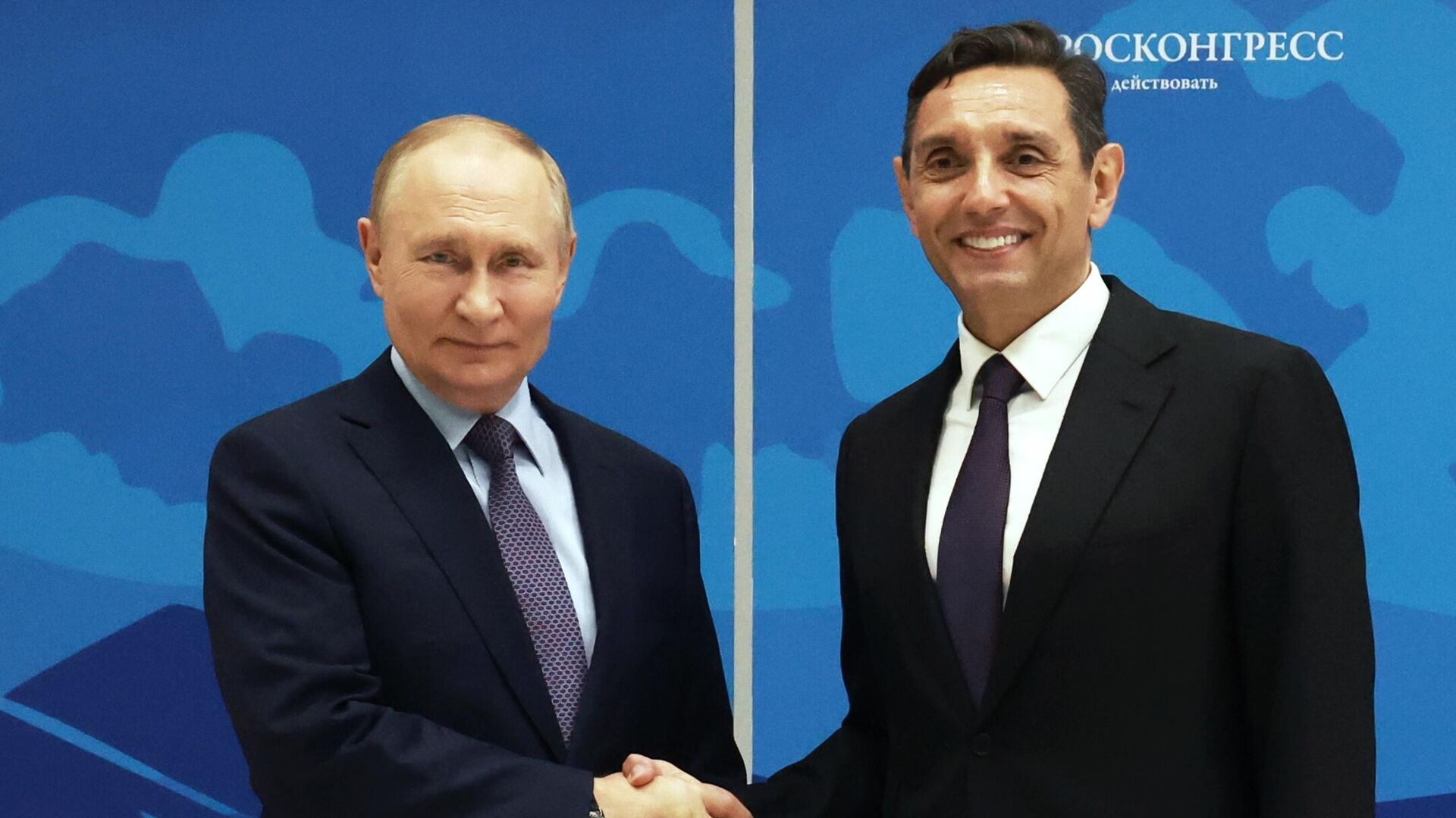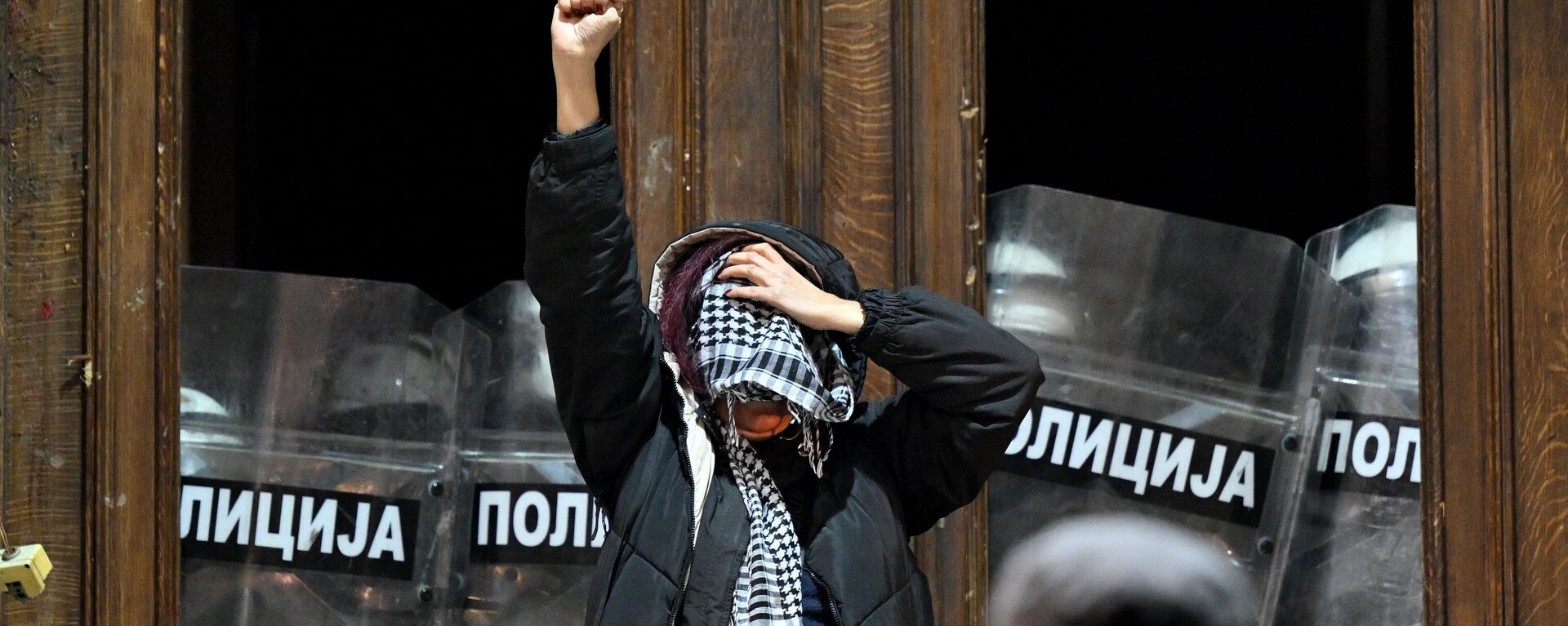https://en.sputniknews.africa/20240913/serbian-deputy-prime-minister-calls-wests-ban-on-russian-media-undemocratic-unacceptable-1068261088.html
Serbian Deputy Prime Minister Calls West's Ban on Russian Media Undemocratic, Unacceptable
Serbian Deputy Prime Minister Calls West's Ban on Russian Media Undemocratic, Unacceptable
Sputnik Africa
ST. PETERSBURG (Sputnik) - Western countries cannot call themselves democracies while banning Russian media, Serbian Deputy Prime Minister Aleksandar Vulin... 13.09.2024, Sputnik Africa
2024-09-13T10:33+0200
2024-09-13T10:33+0200
2024-09-13T12:29+0200
serbia
russia
europe
russia today (rt)
sputnik
us state department
international
freedom of press
freedom of speech
european union (eu)
https://cdn1.img.sputniknews.africa/img/07e8/09/0d/1068260915_0:0:2163:1216_1920x0_80_0_0_205b9c603bbbf514d7b6044016a27252.jpg
"One of the most important parts of democracy is freedom of choice, freedom of information, freedom of voice. I cannot understand how can they call themselves democratic societies, when they say to the Russian media they cannot work their own job. It’s not acceptable for Serbia," Vulin said in an interview. Vulin spoke to Sputnik on the sidelines of a meeting of BRICS+ high-ranking officials in charge of security underway in St. Petersburg. The former Serbian security chief said that the Balkan nation was the only place in Europe where anti-Russia sentiment had not taken hold. On September 4, the US Department of Treasury announced sanctions against RT Editor-in-Chief Margarita Simonyan and her two deputies. Deputy Director of the RT English-Language Information Broadcasting Andrey Kiyashko, RT’s Digital Media Projects Manager Konstantin Kalashnikov, and a number of other employees of the broadcaster were also added to the sanctions list. The US State Department, in a parallel move, tightened the operating conditions for Rossiya Segodnya and its subsidiaries, designating them as "foreign missions." Under the Foreign Missions Act, they will be required to notify the department of all personnel working in the United States and disclose all real estate they own. Meanwhile, the US authorities have charged Kalashnikov and another RT employee, Elena Afanasyeva, with money laundering conspiracy and violating the Foreign Agents Registration Act (FARA).
https://en.sputniknews.africa/20231225/serbian-prime-minister-thanks-russian-special-services-for-warning-about-impending-unrest-1064291320.html
serbia
russia
europe
united states (us)
north america
Sputnik Africa
feedback@sputniknews.com
+74956456601
MIA „Rossiya Segodnya“
2024
Sputnik Africa
feedback@sputniknews.com
+74956456601
MIA „Rossiya Segodnya“
News
en_EN
Sputnik Africa
feedback@sputniknews.com
+74956456601
MIA „Rossiya Segodnya“
Sputnik Africa
feedback@sputniknews.com
+74956456601
MIA „Rossiya Segodnya“
serbia, russia, europe, russia today (rt), sputnik, us state department, international, freedom of press, freedom of speech, european union (eu), united states (us), north america, sanctions, us sanctions, anti-russian sanctions
serbia, russia, europe, russia today (rt), sputnik, us state department, international, freedom of press, freedom of speech, european union (eu), united states (us), north america, sanctions, us sanctions, anti-russian sanctions
Serbian Deputy Prime Minister Calls West's Ban on Russian Media Undemocratic, Unacceptable
10:33 13.09.2024 (Updated: 12:29 13.09.2024) ST. PETERSBURG (Sputnik) - Western countries cannot call themselves democracies while banning Russian media, Serbian Deputy Prime Minister Aleksandar Vulin told Sputnik on Thursday, saying such a move was unacceptable.
"One of the most important parts of democracy is freedom of choice, freedom of information, freedom of voice. I cannot understand how can they call themselves democratic societies, when they say to the Russian media they cannot work their own job. It’s not acceptable for Serbia," Vulin said in an interview.
Vulin spoke to Sputnik on the sidelines of a meeting of BRICS+ high-ranking officials in charge of security underway in St. Petersburg. The former Serbian security chief said that the Balkan nation
was the only place in Europe where anti-Russia sentiment
had not taken hold. "We are the only and sole part of Europe where anti-Russian hysteria does not take place. We do not try to forbid Russian media to do their job, like in all other parts of Europe. In Serbia, you hear Sputnik, you hear Russia Today, you hear in cable television numerous [media], Rossiya 24, Rossiya 1, et cetera. So, we are completely free," he said.
On September 4, the US Department of Treasury announced sanctions against RT Editor-in-Chief Margarita Simonyan and her two deputies. Deputy Director of the RT English-Language Information Broadcasting Andrey Kiyashko, RT’s Digital Media Projects Manager Konstantin Kalashnikov, and a number of other employees of the broadcaster were also added to the sanctions list.
The US State Department,
in a parallel move, tightened the operating conditions for Rossiya Segodnya and its subsidiaries, designating them as "foreign missions." Under the Foreign Missions Act, they will be required to notify the department of all personnel working in the United States and disclose all real estate they own.
The US authorities also announced restrictions on the issuance of visas to individuals they allege are "acting on behalf of Kremlin-supported media organizations." However, the Department of State refused to disclose the names of those subject to the new visa restrictions. Commenting on the new sanctions, State Department spokesperson Matthew Miller claimed the measures did not target any particular individual Russian journalists, but rather the employees of the targeted companies who were involved in "covert activities."
Meanwhile, the US authorities have charged Kalashnikov and another RT employee, Elena Afanasyeva, with money laundering conspiracy and violating the Foreign Agents Registration Act (FARA).


